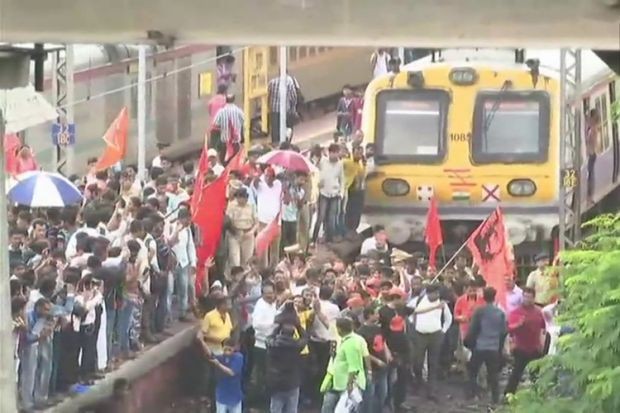
The Maharashtra State Backward Class Commission has recommended a 16 percent reservation to Marathas. This quota will be over and above the current 52% reservation in the state taking the total up to 68%.
According to sources, the commission, headed retired Justice MD Gaikwad, has taken into note that Marathas comprise 30% of Maharashtra’s population and remain socially and economically backward.
The recommendations say that the population of Marathas fit all the 25 criteria of backwardness.
Currently, there is 52 per cent reservation in the state, however the commission has noted that the reservation to Marathas has to be granted without touching the quota granted to the OBCs. This would now take the total reservation up to 68%.
The secretary of the commission is to submit the report to Maharashtra Chief Secretary DK Jain in the next 15 days. The government will take 15 days to complete the constitutional process on the report and it would be submitted in a sealed report in the next cabinet meeting
Reports say that the Devendra Fadnavis government may pass the reservation bill for Marathas in the winter session of the Assembly.
The Maharashtra Govt had referred the issue of Maratha reservation to the backward class commission in June 2017. The commission started working on the issue since August 2017.
The state legislature in 2014 passed a bill to grant quota to the community. That law was stayed by the Bombay High Court. The present government had then approached the Supreme Court. With no relief in sight in the apex court, the state government again approached the High Court, which asked it to form a backward commission and submit a report through it.
Over the last 15 months, the commission has visited several parts of Maharashtra and they have heard grievances of around 2, 00,000 members of the Maratha community members which was also followed by a survey of 25,000 families.
The data from the survey was collated with the grievances put forth by the community members during public hearings and this herculean exercise took months to be completed. The commission sources have said that the efforts were taken to ensure that the provision doesn't fail the legal test.
In the aftermath of the agrarian crisis in the state, the Marathas, who form around a third of the state's nearly 13 crore population, have been agitating since last year demanding reservation in jobs and education.
Initially, the protesters held over 50 'mook morchas' (silent marches) in 2016 and 2017 across the state pressing for reservation among other demands. The protests took a violent in August this year when protesters attacked buses, stopped train services and blocked highways in parts of the state. This round of violece also saw a youth commit suicide by flinging himself in Godavari river in Aurangabad, while a demonstrator died by consuming poison. As many as 194 people were arrested by the police for rioting and arson.
Apart from demanding a decision on their demands at the earliest, the community members sought a waiver of farmer loans, justice in Kopardi rape case and a solution to unemployment.
In December last year, even the Andhra Pradesh state Cabinet, chaired by Chief Minister N Chandrababu Naidu, approved the Justice Manjunatha Commission’s recommendations to earmark 5% for Kapus. The commission had been constituted to look into the status of Other Backward Classes and the several-decades-old demand to include Kapus and their subsections – Telaga, Balija and Ontari – into the category.
Kapus in Andhra Pradesh, Marathas in Maharashtra, Jat in Haryana and Patidars of Gujarat are the ones who had demanded reservation after the agrarian crisis took a toll on these particular castes.


.jpeg)

